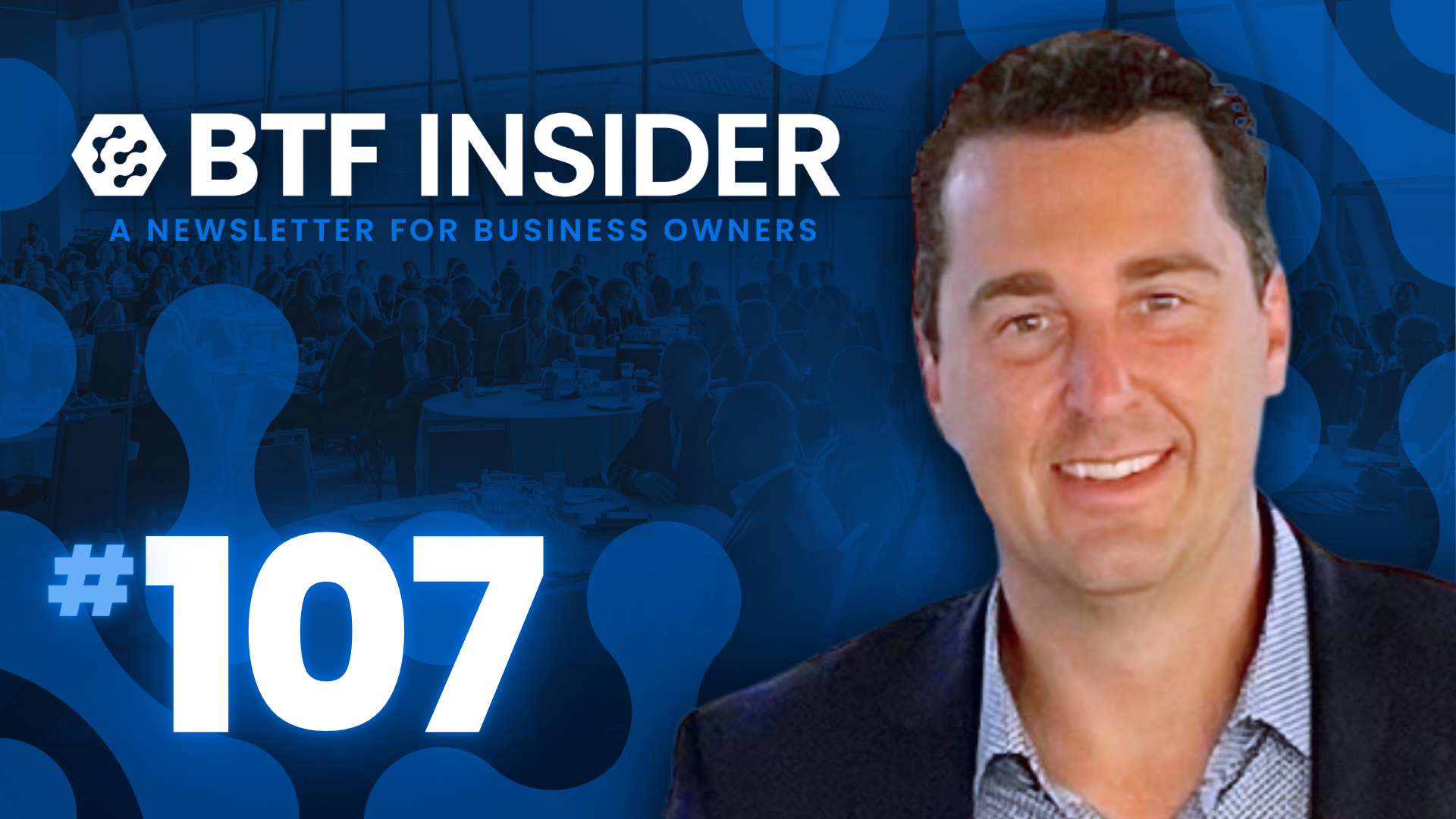Dear BTF Community,
Some entrepreneurs plan every step before they take it. Others build the path as they go.
Geoff Bell is one of the latter.
From oil rigs in northern B.C. to multiple tech exits, his story proves that success rarely follows a straight line but persistence always pays off.
When we spoke with Geoff ahead of BTF Vancouver 2025, he shared lessons from three decades of building, scaling and selling companies. His focus: how to make a business truly exit-ready, when to step back as a founder and why every entrepreneur should design for independence from day one.
Key Takeaways for Business Owners:
- Think exit early. Build every company as if a buyer could walk in tomorrow.
- Structure for independence. Design systems that don’t rely on you or any one person.
- Recognize the stages. Each revenue milestone demands a new operating model.
- Earnouts are hard. They tie you to someone else’s playbook.
- Failure fuels progress. The wins only matter because you survive the losses.
Enjoy,
Mark
The Accidental Entrepreneur
Geoff’s first steps into business were born from necessity, not ambition.
“I became an entrepreneur because I didn’t really have any other options. I wasn’t educated, I didn’t go to university, I was terrible in school… It was very much survival — this is my only option.”
After working in heavy labour and commercial diving, he bought his first company; the diving school where he had trained. It became his first lesson in leadership, failure and resilience.
“The reality of my journey has been far more failures than successes… you hit walls and you have to reinvent the business and it’s just that the successes outweigh the failures enough that you can survive.”
That pattern (learning, adapting, reinventing) defined every venture that followed.
Exit-Ready From Day One
Experience taught Geoff to think differently about how businesses are built.
“Now, any business that I’m involved in has a predetermined exit strategy or plan. I build the business to be exitable from the beginning.”
That mindset changed how he measures success. Every new venture starts with an exit framework, even if he never sells.
“I pre-plan the fact that I’m going to exit this business. And if I don’t, it means I’ve built a really healthy company that’s cash-flowing… so it gives you the luxury of not selling.”
A company designed for transition is inherently stronger. Clean systems, transferable relationships, and consistent cash flow don’t just prepare a business for sale they protect its value while you own it.
The Earnout Reality
One of Geoff’s hardest lessons came after the deals were signed.
“I had earnouts on nearly all my exits — most founders do, because their businesses are tied to the relationships they’ve built. But those are tough; you rarely see eye to eye with the acquiring company’s way of operating.”
The takeaway: build independence early. If your company can’t run without you, the buyer’s risk (and control) increases.
“The goal is to build a business that doesn’t rely on me, where people are in defined roles and no part of the company depends on any one person, including the founder or the CEO.”
When Founders Must Step Back
Letting go, Geoff admits, can be the hardest part.
“I tell my team, I’m the CEO only as long as I make the right decisions 70 percent of the time. As a founder and CEO, I need to be able to step back and recognize that this business is an entity beyond me — it’s not mine.”
That perspective creates space for better decisions and smoother succession. Buyers notice when a leadership team can operate independently; it’s a sign the company will thrive after the transition.
The Revenue Reality Check
Geoff breaks growth into clear, practical stages:
“Zero to a million dollars in revenue, you can do on your own… one to two million is when you really need a team… but the big pivot comes from two to five million — that’s where you need a machine. And beyond five million is where you get creative.”
Many founders plateau because they keep operating the same way at every stage.
Geoff’s rule is simple: the systems that get you to $1 million won’t get you to $5 million, and what works at $5 million must evolve again. You have to think strategically, invest in efficiency, strengthen your position, or acquire to grow market share and revenue.
Smart acquisitions build both talent and profit.
Finding Gold In Overlooked Markets
While Geoff has built and exited across sectors, one industry continues to capture his attention: quick-serve restaurants.
“Quick-serve restaurants are the farthest behind in innovative tech and AI… it becomes this really hyper-scalable SaaS opportunity that solves a very real problem with technology that nobody else knows how to get into.”
Fragmented, under-served markets like this are where he sees the greatest opportunity, especially for entrepreneurs who understand how to use technology to create efficiency and scale.
Profit With Purpose
More recently, Geoff has applied the same commercial discipline to environmental ventures. His view is pragmatic: sustainability only scales when it’s profitable.
“I don’t believe that people inherently are going to spend more money to buy something that’s good for the environment… it has to deliver a bigger ROI than the traditional route.”
He calls it profitable conservation, businesses that make financial sense first and environmental sense as a result.
Final Reflection
Geoff Bell’s journey is a study in resilience and reinvention. From underwater construction to software exits, he’s proof that entrepreneurship doesn’t always require credentials; it requires persistence, planning and the humility to step aside when the business outgrows you.
For owners building toward transition, his advice is simple: design for exit from the beginning, create a company that thrives without you and treat every growth stage as new ground to master.
Because the best time to prepare for an exit isn’t the day you’re ready to sell, it’s the day you start building.



